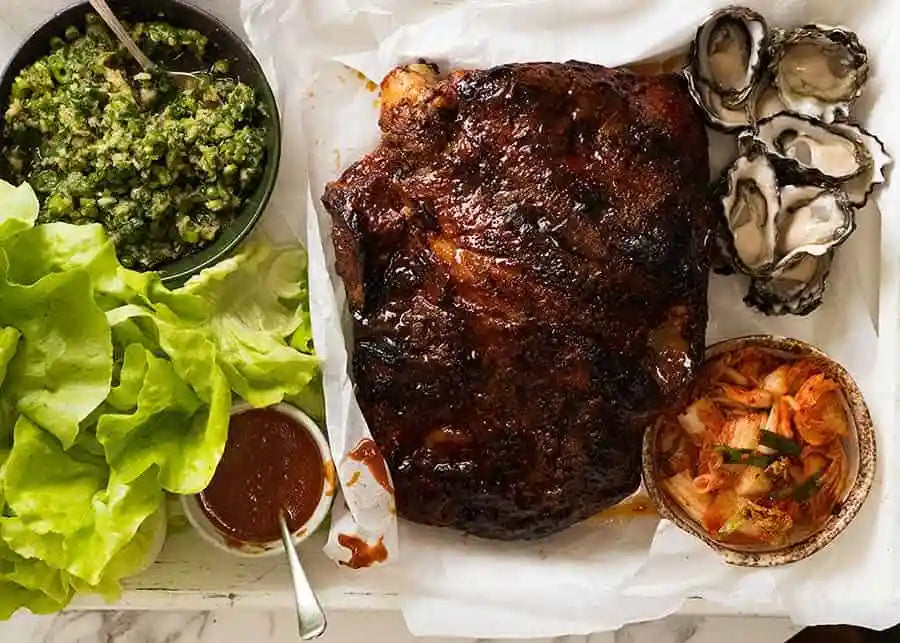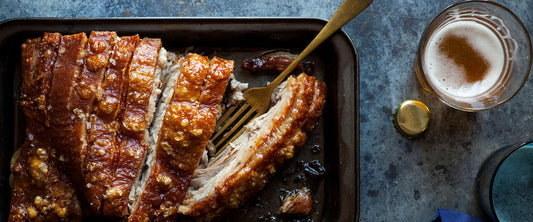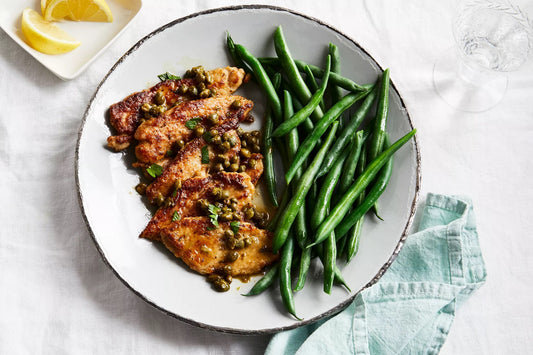
This is David Chang's famous Momofuku Bossam (or Bo ssam), his take on the traditional Korean pork dish that costs US$250 at his NYC restuarant! Pork shoulder is dry cured so it's seasoned from end to end, then slow roasted until fall apart tender and finished with a brown sugar crust. Serve with condiments for DIY lettuce wraps for an epic eating experience that will be remembered for years to come!
Recipe from: www.recipetineats.com/
Ingredients
SLOW COOKED PORK:
- 3.5-4 kg/ 7-8 lb pork butt / shoulder , bone in & skinless (Note 1)
- 1/2 cup (110g) white sugar
- 1/2 cup (115g) kosher or cooking salt (NOT table salt) (Note 2)
BROWN SUGAR CRUST:
- 1 tbsp kosher or cooking salt (NOT table salt) (Note 2)
- 7 tbsp brown sugar , light or normal (not dark)
GINGER SHALLOT SAUCE:
- 2.5 cups scallions , thinly sliced (both green and white parts, ~5-6 stems)
- 1/2 cup fresh ginger , peeled and finely grated (Note 3)
- 1/3 cup canola oil (Note 4)
- 1.5 tsp light soy sauce (or all purpose, not dark soy sauce Note 5)
- 1 teaspoon sherry vinegar (Note 6)
- 1/2 tsp kosher or cooking salt , to taste (Note 2)
SPICY SSAM SAUCE (NOTE 7):
- 2 tbsp ssamjang (Note 8)
- 1 tbsp gochujang (Note 8)
- 5 tsp sherry vinegar (Note 6)
- 2 tbsp canola oil (Note 4)
- 1 tbsp water
- 1 tsp white sugar
SERVING:
- 4 - 5 heads butter/bib lettuce (40 - 50+ leaves, Note 9)
- 3 cups cooked white rice
- 500g/1lb kimchi
- 12 + oysters , raw, in shell (optional, Note 10)
Instructions
-
Mix sugar and salt together. Pat pork dry. Coat pork in sugar salt mixture, getting it into all the crevices. Rub/pat well to adhere as best you can - discard excess salt unused/falls off (usually ~ 2-3 tbsp).
-
Place in a glass dish (Note 13), cover loosely with cling wrap and refrigerated 24 - 36 hours (Note 11).
-
Preheat oven to 150°C/300°F (all oven types) with rack in the middle of oven.
-
Remove pork from fridge - surface will be wet. Either transfer pork to clean pan (metal, ceramic or glass) or drain off excess liquid / scrape out salt/sugar in same glass pan. Do not rinse pork.
-
Roast 5 hours (Note 12), uncovered, spooning over pan juices once each hour, until you can easily pull the meat apart with 2 forks (check on side).
-
Remove from oven, rest for 10 minutes (up to 1 hour is fine, loosely cover in foil).
-
Turn oven up to 260°C/500°F (all oven types).
BROWN SUGAR CRUST:
-
Mix brown sugar and salt.
-
Spoon juices all over pork.
-
Spoon sugar onto pork and use your hands to make it stick to the top and sides (not underneath). Make layer on top as even as you can (for even caramelisation).
-
Place in oven for 10 minutes until surface is a deep golden crust, sugar is bubbling and caramelised (see VIDEO!). Keep a close eye on it from 5 minutes. If the highest points start getting black, cover with small piece of foil (just stick it on).
-
Remove from oven and transfer to serving platter for serving. (Don't use pan juices, it will be salty from brine)
SAUCES:
-
Ginger Shallot Sauce: Mix ingredients in bowl and stand for 20 minutes to let it soften.
-
Ssam Sauce: Mix ingredients together. Oil will naturally separate over time if sauce is left to stand, just mix again to reincorporate.
SERVING:
-
Place pork on serving platter with lettuce, oysters, kimchi, rice, Ginger Shallot Sauce and Ssam Sauce on the side.
-
Attack the pork - it will shred easily. Shred as much or little as you want, let people do it themselves or you can do it for them. Prepare to fight over the epic crust.
-
To eat, place lettuce in hand. Spoon in some rice, top with pulled pork, small piece of kimchi, oyster, some ginger shallot sauce then finally a little drizzle of spicy Ssam sauce.
-
Bundle up, bite and enjoy!
Recipe Notes:
1. Pork - Pork Butt is a cut of pork shoulder that is much larger than the usual pork shoulder sold in Australian supermarkets. It is a formidable block of meat, a nice even rectangle shape which is key for ensuring the pork is slow cooked evenly so every part is meltingly tender - no dry bits anywhere!
Find it in butchers and Costco (Australia).
3.5-4kg/7-8lb is the ideal weight for best result (bone in, skinless) - the most incredible juicy pulled pork. Up to 4.5kg is still near perfect too. While this recipe will work very well for smaller pork shoulder, because the meat will cook faster it won't develop quite the same flavour on the surface. See Note 12 for cook times for different sizes.
2. Salt - DO NOT USE TABLE SALT, it will be too salty (grains too fine, gets into pork too much). Use kosher or cooking salt, grains are larger.
If you have no choice but to use table salt (really not ideal though), cut down to 1/4 cup (ie for rub) and 1 1/2 tsp in Brown Sugar Crust and only Dry Cure for max 12 hours.
3. Ginger - finely grate using a microplane or similar. If you don't have one, mince with knife until very very fine.
4. Oil - or grapeseed, peanut or vegetable oil
5. Soy sauce - use light or all purpose. Don't use bottle labelled "dark soy sauce", far too intense flavour.
6. Sherry vinegar - sub with any of these: apple cider vinegar, red or white wine vinegar or champagne vinegar.
7. Ssam Sauce - if you can't get your hands on the Gojuchang and Ssamjang paste, don't fret. This Ssam sauce isn't pivotal to the Bossam eating experience. Just make the Chilli Sauce in this recipe (scale up x 4 or 5), or just use Sriracha or another chilli paste instead of making Ssam.
8. Ssamjang and Gochujang - spicy Korean pastes available at most Asian grocery stores, Korean stores and online. Can't find it? Don't stress - read Note 7 for subs.
9. Butter/bib lettuce - soft lettuce often sold with roots. Soft lettuce ideal for making wraps. But crisp "cup" shaped lettuce will be fine too!
Volume - easily makes 50+ lettuce wraps. Just get as much lettuce as you want to serve, knowing there's enough pork for over 50 lettuce wraps (leftover pork is sensational) 10. Oysters - raw oysters are served with traditional bossam, it's part of the eating experience! It's like a "surprise inside" when you're munching through the lettuce wrap and come across the oyster, great textural contrast. Bit indulgent to have an oyster for every piece of lettuce so just provide as much as you're willing to indulge in. 11. Brining/curing time - minimum 6 hours, 12 hours ok, 24 - 36 hours optimum, 48 hours ok too (especially if using 4.5kg/9lb pork) DO NOT rinse pork after curing. You should only use enough sugar/salt rub so it sticks to the pork, don't layer it on thickly on the surface. Recipes that suggest rinsing are probably using the wrong salt/sugar amount published in NYT and other media publications which is way too much (see Note 13 for more info). 12. Internal temp of pork is irrelevant in slow roasting because the internal temp doesn't change once cooked beyond well done, but meat can still be tough. Need time not temperature for meat to become fall apart. Oven types - for slow roasting at low temps, I find the same temp is required for standard and fan forced/convection. Cook times - original recipe says 6 hours for 3.5 - 5kg / 7 - 10lb pork shoulder. That's a HUGE variation in pork size and the cook times vary - here is the cook times by weight:
Volume - easily makes 50+ lettuce wraps. Just get as much lettuce as you want to serve, knowing there's enough pork for over 50 lettuce wraps (leftover pork is sensational) 10. Oysters - raw oysters are served with traditional bossam, it's part of the eating experience! It's like a "surprise inside" when you're munching through the lettuce wrap and come across the oyster, great textural contrast. Bit indulgent to have an oyster for every piece of lettuce so just provide as much as you're willing to indulge in. 11. Brining/curing time - minimum 6 hours, 12 hours ok, 24 - 36 hours optimum, 48 hours ok too (especially if using 4.5kg/9lb pork) DO NOT rinse pork after curing. You should only use enough sugar/salt rub so it sticks to the pork, don't layer it on thickly on the surface. Recipes that suggest rinsing are probably using the wrong salt/sugar amount published in NYT and other media publications which is way too much (see Note 13 for more info). 12. Internal temp of pork is irrelevant in slow roasting because the internal temp doesn't change once cooked beyond well done, but meat can still be tough. Need time not temperature for meat to become fall apart. Oven types - for slow roasting at low temps, I find the same temp is required for standard and fan forced/convection. Cook times - original recipe says 6 hours for 3.5 - 5kg / 7 - 10lb pork shoulder. That's a HUGE variation in pork size and the cook times vary - here is the cook times by weight:
- 3.5 - 4kg / 7 - 8lb = 5 hours (best weight for most juicy flesh)
- 4.5/9lb = 5.5 hrs
- 5kg/10lb = 6 hrs
- 2 kg / 4lb = 3 hrs 45 min
- 2.5kg / 5 lb = 4 hrs
- 3kg / 6lb = 4.5 hrs
- Original recipe calls for 1 cup each salt and sugar which is WAY too much. This amount will never stick to the pork so it's wasteful. Sprinkling excess over pork doesn't work either - makes it way too salty. 1/2 cup of each works perfectly - you won't throw out much, seasons the pork perfectly all the way through without being too salty;
- Ssam sauce had way too much vinegar (had 1/2 cup) - way to sour; and
- Cook time - original recipe says 6 hrs for 3.5-5kg/7-10lb pork. That range is too broad - 3.5kg/7lb pork for 6 hours = dry. Found that 3.5-4kg/7-8lb for 5 hrs is perfect, cook times for other weights in Note 12.



